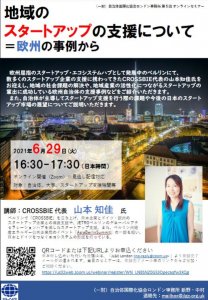 As part of a continuing series throughout the summer, JLGC held an online seminar for our member local authority staff in Japan, with Ms Chika Yamamoto, company representative of CROSSBIE. The Berlin-based company supports the overseas expansion of Japanese startups and business collaboration and co-creation with European startups. Japanese local authorities are active in supporting their local businesses in expansion overseas. The recent Japan-EU trade deal has seen much interest in opportunities in new markets for SMEs in Japan looking overseas to grow their business. Policymakers in Japan are also keen to attract business and investment into the regions.
As part of a continuing series throughout the summer, JLGC held an online seminar for our member local authority staff in Japan, with Ms Chika Yamamoto, company representative of CROSSBIE. The Berlin-based company supports the overseas expansion of Japanese startups and business collaboration and co-creation with European startups. Japanese local authorities are active in supporting their local businesses in expansion overseas. The recent Japan-EU trade deal has seen much interest in opportunities in new markets for SMEs in Japan looking overseas to grow their business. Policymakers in Japan are also keen to attract business and investment into the regions.
In Europe, while London, Paris and Berlin have megacity ecosystems, other cities are also creating business environments with various characteristics. For example, in the case of France, startups in the aviation and space industries are concentrated in Toulouse and Paris has strengths in financing. Germany, in addition to strength in mobility, is seeing growth in Bavaria with digital technologies such as AI and IoT being used to solve problems in medical care, drug discovery and long-term care is seeing the establishment of an ecosystem in health tech.
During the presentation Ms Yamamoto, gave examples of private-sector-led support included the establishment of co-working spaces and meeting venues. More than half of the people migrating to Berlin are from other countries, with more than 180 nationalities. In Berlin has seen the establishment of co-working spaces, attracting an international workforce. In addition, investment is increasing due to the concentration of innovation departments of large companies such as BMW, and now an ecosystem of specialists in various fields such as mobility, AI, blockchain has grown.
An example of government-led support is the project “Asia Berlin” by the Bureau of Economy, Energy and Enterprises of Berlin City, launched to strengthen ties with Asian cities, and hold the annual “Asia Berlin Summit” regular webinars. In addition to platforming the start-up companies and local ecosystems, Berlin also provides subsidies (2,000 euros per month) to companies setting up there, free use of working spaces, introducing mentors and partners, etc., with particularly strong support during the period of office establishment.
In the Slovenian capital Ljubljana, where many small and medium-sized manufacturing companies are concentrated, exports to Germany and Austria are considerable, and nine percent of GDP comes from exports. As a small city, domestic demand was scarce, and it was struggling to attract inbound and foreign-affiliated companies. Supporting foreign-affiliated companies and start-ups aiming to enter the EU with the keyword “City as a service” promoting cooperation with overseas cities and companies outside the EU. In addition, as a public-private project, “City Lab” was launched, in collaboration with large commercial areas in the city, entertainment facilities such as movie theatres, amusement parks, restaurants, and offices etc.
Private sector professionals with business development experience have been appointed to the innovation department of the city of Ljubljana, and participate as volunteer CEOs at the acceleration facility in the “City Lab” facility building a system that allows private companies and the government to cooperate smoothly.
111 participants registered for Ms Yamamoto’s presentation, including staff from cities looking to support local inward investment and overseas expansion of local companies. Cities in Japan, such as Fukuoka and Kobe, offer entrepreneurs start-up visas and offer a rent subsidy program in which new businesses can get half of their office and personal rent covered (up to one million yen). Tax reductions have also been implemented for startups operating in some specific industries. Local banks have startup loans with a low interest rate (1.3%). The burn rate (time you can use a certain budget to cover salaries, rental and cost of living in general) is also much lower in smaller cities when compared to other Japanese cities, like Tokyo and Osaka, allowing entrepreneurs to get much more done with the same amount of funding.
All seminar reports are available HERE (Japanese only), with videos of recent online events, as well as details of seminars coming. Many thanks to Ms Chika Yamamoto and CROSSBIE for speaking.

